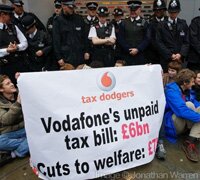The left, the right and the ‘return of the 1930s’ thesis
The idea that the world economy is about to undergo a re-run of the 1930s is becoming so common among mainstream economic commentators that is in serious danger of becoming a cliché.
But when likes of George Soros toy with that idea, they do so for express symbolic effect. Resort to any notion of a return to the years of Great Depression is the kind of talk purposely designed to shake people up. It is, in effect, the most serious warning it is possible to give.
That decade is deeply entrenched in the collective memory of the free market right as the years in which the wheels nearly came off the capitalist show.
We’ve all seen the black and white newsreel footage; the Jarrow March, the soup kitchens, the Hoovervilles, the rise of fascism in country after country.
Many of us will augment those pictures with the stories we heard as children from older members of our families who were caught up in the crosscurrents. In my case, educated men were reduced to shining shoes for a living, or ignominiously deported from countries in which they tried to find work without a work permit.
It’s worth noting that this still is 2008 and not 1931; some sections of the left have at times given the impression that they would relish a slump of Great Depression proportions, on account of the effect they imagine this would have in radicalising popular political consciousness.
Given the sheer extent of the human misery this would entail, that is unforgivable. It also seems to forget that – at the level of government, at least – the principle beneficiary of hard times is all too often the reactionary right.
Little wonder, then, that the ‘1930s in slow motion’ perspective developed by Tony Cliff at the start of the 1990s proved to be wishful thinking during a period which saw the start of sustained capitalist expansion, disastrously wrong-footing the Socialist Workers’ Party for an entire period.
What conclusions can we draw? At the very least, the financial markets crisis of 2008 is likely to mark an important political turning point. When governments of the ideological stripe of George W Bush are forced to resort to state intervention on a titanic scale, it cannot fail but to bolster case for tighter regulation of the free market.
It suddenly turns out that the very things that globalisation supposedly rendered impossible for nation states in this day and age – the nationalisation of major financial institutions, or a ban on short selling, for example – can be done in no time flat if need be.
Deregulation has been an integral component of neoliberalism as it has emerged in the west over the last 30 years. One of the first actions of the Thatcher administration was to scrap wage, price and exchange controls, and it followed through with the Big Bang in 1986.
The climate is all of a sudden very different, and could expand the political space available to modern social democracy, and perhaps revive a current that has sometimes seemed at death’s door in recent years.
But what if the pessimists are right? Such a possibility must be at least measurable. In that case, the basic underlying question of all economics – which class gets what – is back on the agenda in a way it has not been for a long time.
That will mean an audience for radical answers to that question. Perhaps it’s not for nothing that the Archbishop of Canterbury has suddenly taken to favourably mentioning of Karl Marx.
-------------------------
| Tweet |
Dave Osler is a regular contributor. He is a British journalist and author, ex-punk and ex-Trot. Also at: Dave's Part
· Other posts by Dave Osler
Filed under
Blog ,Economy
4 responses in total ||
All this depends upon reading the economic circumstances as similar to 1929. I think they are closer to those which existed in 1907.
Know your history.
Thomas,
Forgive my ignorance, but I don’t know my history. Could you tell me some more about 1907 as opposed to 1929?
xD.
Hey Dave,
Try this Wiki page.
There are major differences between 1907 and 2008, namely that there was no Federal Reserve in 1907 to deal with rampant bank-runs, and the economy was already in a recession. The US at present is, apparently, growing 2.2% – although expect a deep recession to set in in the coming quarters.
Today is more similar to 1907 in that the stock market level was the result of a derivitives bubble (commodities then, now property), while the 1929 stock bubble was the direct result of consumer debt speculation.
But today’s international crisis should be seen as more similar to 1907 because no comparitor to a federal reserve on a global scale currently exists.
The post-civil war panics occurred partly as a result of a vastly complex system of decentralised state-regulated banks as the country integrated. As international integration has gathered pace since the end of the cold war a similarly complex system of decentralised nationally-regulated banks has caused serious recessions costing a tenth or more of GDP in more than a dozen cases (Europe post ERM, Mexico following the peso devaluation of 1994-5, Asia after the 1997 Thai collapse etc).
In both situations, the national financiers of the post-civil war period and the international financiers of the post-cold war period benefited from their ability to exploit different regulatory regimes through carry trade and differential rates.
Also in both situations the opaque links between financiers and politicians have enabled emplacement of an effective system of controls to be resisted (Paulson as Treasury Secretary and former Chairman of Goldman Sachs personifies the overcentralisation of unaccountable influence in unelected hands).
Finally, the ultimate result of the 1907 panic provides the best indicator of a solution to today’s problems: the 1908 Aldrich-Vreeland Act paved the way for an interventionist policy and the creation of the federal reserve in 1913 – so, while Bush’s proposal to provide a bail out really only postpones the reform of the system (by postponing the full extent of the correction), Brown is only half-way there in seeking to build an international early-warning system.
Reactions: Twitter, blogs
Sorry, the comment form is closed at this time.
You can read articles through the front page, via Twitter or RSS feed.
» What if Superdrug lived up to its name?
» Why we want to ‘recall’ Aaron Porter as NUS President
» Breakthrough in drugs debate as MPs call for full decriminalisation
» Report shows how the promise on NHS spending has been broken
» Why climate talks in Cancun failed miserably
» Why cuts to local councils will be much worse than Tories suggest
» Left unity and the bid to oust Aaron Porter
» The true horror of NHS privatisation is slowly coming out
» Why these protests are more dangerous than politicians realise
» How the police and then the BBC tried to humiliate Jody McIntyre
» Why local and national referendums are a really bad idea
|
4 Comments 14 Comments 42 Comments 39 Comments 33 Comments 19 Comments 33 Comments 34 Comments 72 Comments 146 Comments |
LATEST COMMENTS » Bored London Gurl posted on Consumer confidence falls to a 20-month low » Sarah AB posted on IFS destroys Coalition claims for cutting EMA » Sue Bristow posted on Ten myths about housing benefit reforms in London » Michael Hanley posted on Consumer confidence falls to a 20-month low » Ulrike Singer-Bayrle posted on Consumer confidence falls to a 20-month low » Liberal Conspiracy posted on Consumer confidence falls to a 20-month low » dave bones posted on Breakthrough in drugs debate as MPs call for full decriminalisation » dave bones posted on Breakthrough in drugs debate as MPs call for full decriminalisation » G.O. posted on What if Superdrug lived up to its name? » Tim Worstall posted on Ten myths about housing benefit reforms in London » David Wearing posted on Why we want to ‘recall’ Aaron Porter as NUS President » Nick L posted on Ten myths about housing benefit reforms in London » Tyler posted on Ten myths about housing benefit reforms in London » philip murtagh posted on Ten myths about housing benefit reforms in London » James posted on IFS: Child Poverty to rise due to Coalition plans |















